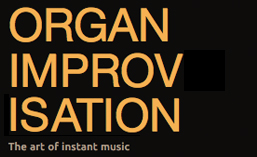Yesterday, I had the opportunity to play part of a Sunday Matinee concert at the Cathedral Church of St. Luke in Orlando, Florida. I opened the program with one of my own compositions which I had written as a gift for the music director at the Cathedral. For the rest of my portion of the program, I was to improvise on hymn tunes suggested by the audience. While several people offered compliments to me after the concert was over, I actually discovered something that I’d like to offer as a practice tip for this week.
Random Selection
If you ever accept theme suggestions from the audience, you have to be prepared for just about anything. By requesting that people submit something from the hymnal for the drawing, we made an attempt to limit the realm of thematic material I would be working with. When I showed up to practice, I would open the hymnal randomly and improvise on whatever tune was in front of me, so I thought I had covered this random selection process well in my preparation. By asking for the person’s favorite hymn, I also suspected that many of the suggestions would be familiar tunes that I had practiced before. (Now that I have the complete set of index cards with the audience submissions, I have a few tunes to add to the list of hymn and chorale themes at organimprovisation.com.)
Caught off Gaurd
Having improvised on a submitted theme at the end of numerous other concerts in addition to improvising multiple pieces for church services every week, I thought Sunday’s task of filling 15-16 minutes with improvisations on potentially four different themes would be easy. After all, that’s really only 4 minutes each. A simple ABA form or even an ornamented chorale variation could take that long, and I’ve done those every week for years. What I failed to realize was the time compression that was required for the concert. Rather than knowing the hymns for the week several days in advance and having other elements of the service to provide time for reflection in between improvisations, I now basically had to choose an order of the themes, and improvise the equivalent of the prelude, offertory, communion, and closing voluntaries all strung together. No breaks.
Shift
My challenge became not how fast can I play, but how fast can I mentally change gears? Whether you break out the metronome and ratchet up the speed gradually or look for efficiencies while playing slowly, physical technique for speed seems a lot easier to tackle than mental agility. While I’m still contemplating how I could have better prepared for yesterday’s mental challenges, here are a few ideas that I plan to practice before doing this again:
- Practice improvising while watching the clock. Choose not only a theme and form, but also a duration and make sure the improvisation runs for the allotted time.
- Open the hymnal at random, count to ten, then start! Practice giving yourself the least amount of time possible between discovering the theme and starting to play.
- Use a random number generator (like http://www.random.org/) to generate a list of page numbers from the hymnal. Improvise on each of the tunes in the order given on the list.
- Practice in “performance mode.” No stopping. No redos. Play straight through from start to finish.
- Set a timer to beep every two minutes (or an even shorter interval). Every time it beeps, change theme, change key, and/or change form. Practice this doing dramatic shifts as well as doing more subtle shifts.
One of the practice ideas I heard in a masterclass with Tom Trenney was to make a deck of cards with forms or improvisation techniques written on them and then to draw randomly from the deck to see what you would improvise. I think you could also have a deck of themes and even a deck of keys/modes. The weakness I discovered at yesterday’s concert was not with any of the cards that were in the deck, but in my ability to flip from one card to the next quickly.
The Fix
The remedy I see at the moment is to use a timer to force me to change ideas quickly. We are all used to practicing with a metronome for technical speed, so why shouldn’t we use something to measure our mental speed? How else can we train ourselves to think faster? I’d love to hear any ideas you might have.
Hoping all your improvisations shift gears smoothly!
Glenn
PS. In case you’re wondering, the four hymns that were selected by the audience were Holy, Holy, Holy (NICAEA), Be Thou My vision (SLANE), Rock of Ages, and All Creatures of Our God an King (LASST UNS ERFREUEN). What would you have done with these themes?
Recent additions to organimprovisation.com:
Organists:
Mode:
Theme:
Newsletter Issue 24 – 2014 10 13
See the complete list of past newsletter issues here.
Sign up to receive future issues using the box to the right on this page.
